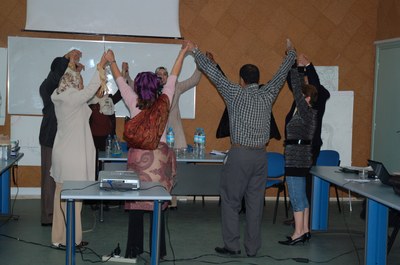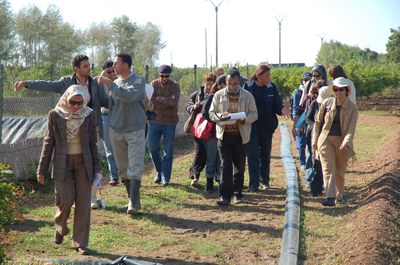Francophone ToT workshop Gender Mainstreaming in IWRM
The participants to this training came from Francophone Arab Countries: Morocco (10), Tunisia (5), Algeria (2) and Comoro Island (1); most of them are working in the water, agriculture, health, and/or education sector with an active participation in local NGO’s in Gender, water, and/or environment.
The main objective of this TOT workshop is to increase the number of capable trainers and to strengthen the capacity of trainers to effectively train others in the principles of Gender and Integrated Water Resources Management (IWRM) and to mainstream gender in IWRM planning and implementation in the Arab Region. The training focused on Gender analysis and IWRM with a special attention to communication, negotiation and advocacy skills (facilitation exercises, role plays and advocacy presentation).
 To maximize the mutual learning process some participants were invited to do presentations of their experiences in one of these subjects. During several presentations, the position of women in relation to the Islamic religion in Arab countries was in the center of the discussions. Although being countries with deeply different culture, there is evidence of the existence of a common language; the language stating that violence against women is a violation of human rights and that there cannot be basic rights that are not extended to women. Today, in these countries, national laws recognize the same rights on the socio-economic, cultural and political level, for women and men but they discriminate women in family relations. However, few cases should be underlined, the case of Tunisia because of national politics, which gives since the sixties equal chances to men and women and that of Morocco where reforms are in hand since the nineties and a new family code was instituted in 2003.
To maximize the mutual learning process some participants were invited to do presentations of their experiences in one of these subjects. During several presentations, the position of women in relation to the Islamic religion in Arab countries was in the center of the discussions. Although being countries with deeply different culture, there is evidence of the existence of a common language; the language stating that violence against women is a violation of human rights and that there cannot be basic rights that are not extended to women. Today, in these countries, national laws recognize the same rights on the socio-economic, cultural and political level, for women and men but they discriminate women in family relations. However, few cases should be underlined, the case of Tunisia because of national politics, which gives since the sixties equal chances to men and women and that of Morocco where reforms are in hand since the nineties and a new family code was instituted in 2003.
The field visit showed a very interesting regional IWRM programme in the Tadla region with a huge irrigated plain for products like, cereals, olives, oranges, sugar beet, vegetables and also cattle. Tadla plain has to share the only nearest water source in the Atlas Mountains with the urban regions of Casablanca and Marrakech and this situation gives a real stress considering the annual rainfall of 300 mm. Men and women have access to land in this plain, women can be organized in separate organizations (cooperatives) which represent them during the negotiation meetings for water distribution and other decisions.
 At the end of the training, the participants did an advocacy presentation for gender mainstreaming in IWRM in front of directors and representatives of the involved ministries by using theatre, songs and drawings. Participants showed great creativity potential and very rich particular skills. The training ended with the presentation of the work plan of each participant for the delivery of training on Gender and IWRM in his or her own country. With the objective of training participants in becoming trainers with participatory methods, as well as enabling them to select among the most appropriate methods in different circumstances and with different audiences, attention to the training follow up (after training) is an essential part of the TOT course.
At the end of the training, the participants did an advocacy presentation for gender mainstreaming in IWRM in front of directors and representatives of the involved ministries by using theatre, songs and drawings. Participants showed great creativity potential and very rich particular skills. The training ended with the presentation of the work plan of each participant for the delivery of training on Gender and IWRM in his or her own country. With the objective of training participants in becoming trainers with participatory methods, as well as enabling them to select among the most appropriate methods in different circumstances and with different audiences, attention to the training follow up (after training) is an essential part of the TOT course.
The facilitators of this training were: Fatema Mosseddaq from IAV Hassan II, Hammou Laamrani of WADImena, Cecile Ndjebet, GWA trainer of Cameroon and Margriet Reinders GWA facilitator of Francophone West and Central Africa.



